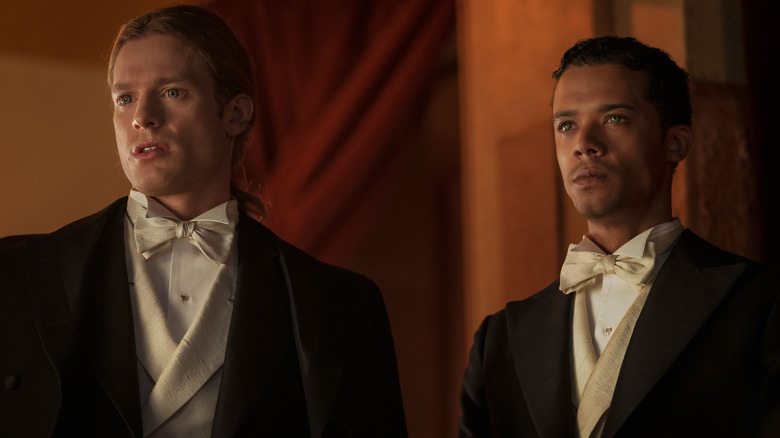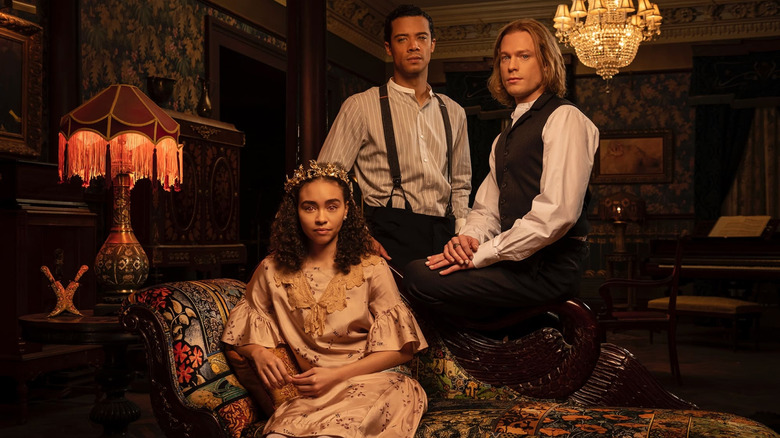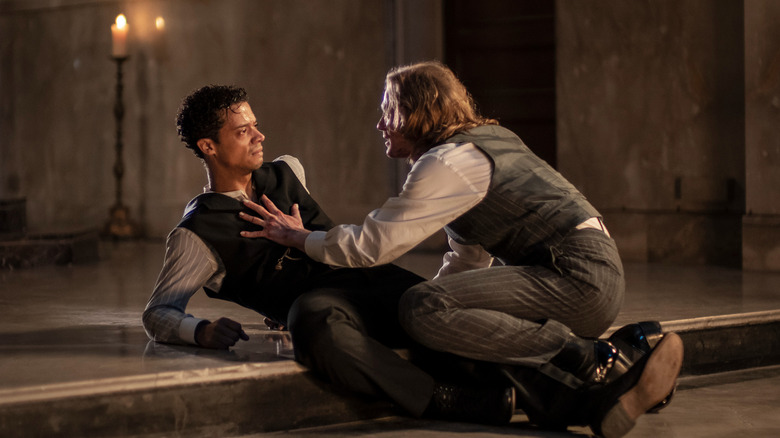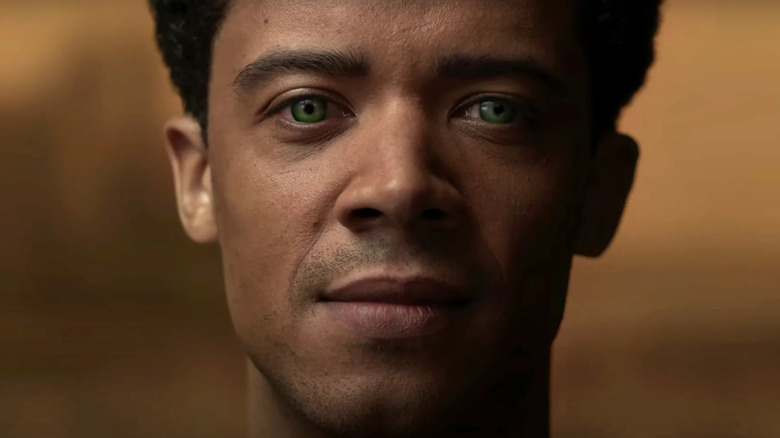The Daily Stream: Interview With The Vampire Is Sexy, Funny And Unapologetically Queer
(Welcome to The Daily Stream, an ongoing series in which the /Film team shares what they've been watching, why it's worth checking out, and where you can stream it.)
The Series: "Interview With The Vampire."
Where You Can Stream It: AMC+
The Pitch: Louis (Jacob Anderson), Lestat (Sam Reid), and Claudia (Bailey Bass), the dysfunctional vampire trio from Anne Rice's "The Vampire Chronicles" are back on our screens in a new series from AMC. Like the novel that gives the adaptation its title, "Interview With The Vampire" offers a very familiar premise: a journalist interviews a vampire. But not everything is as you remember. For one thing, the story picks up in 2022, with dying writer Daniel (Daniel Bogosian) agreeing to one last interview with the century-old vampire whose offering him the story of a lifetime. For him, Louis recounts his origins and many years as a vampire, an epic story that centers on the woes of love, lust, parenting, and immortality. It shares the same basic premise with Rice's novels and the 1994 movie, but with the dramatics dialed up even further (which is really saying something).
Why it's essential viewing
What do you want from a vampire series? Angst? Camp? Gorgeous aesthetics? Queerness that goes beyond subtext? Terrifying exertions of Vampire strength? A magnificent mansion for eternal sulking? Well, consider this your lucky day, because "Interview With The Vampire" checks all of those boxes and then some. It's vampire angst with a healthy dose of comedy, but it also has a lot on the brain. It's parsing through the treasure trove of depth offered in Rice's novels and adding a welcome sprinkle of modernity.
The biggest change from Anne Rice's story comes in the form of our lead character, Louis de Pointe du Lac. In the novel and film, Louis was a white plantation in owner in 1791 Louisiana — slaves and all. But this series starts Louis' origin story 120 years later, in 1910. Here, he's a wealthy Black brothel owner in New Orleans' red-light district and the executor of his family's estate. A closeted Black man living in turn-of-the-century Louisiana, his business options are limited, but Louis has made the best of his circumstances, rising in the ranks as much as he can. (In other words, he can play cards with the local fat cats, so long as he tacks a "sir" onto the end of every sentence.) But everything that Louis once understood about the world changes when he meets Lestat, the vampire who will end and begin his life anew.
Unlike the subtextual approach of the novel and film, there's no question about the nature of Louis and Lestat's relationship. These men are in love — it's a terrible and doomed sort of love, but you get the idea. Wanting an eternal companion, Lestat offers Louis an escape from his human problems that he simply can't resist — and so Louis becomes a vampire.
A toxic vampire romance for the ages
Upon being changed into an immortal, blood-sucking creature, Louis spirals down a worrying path: he exists in an endless state of ennui. He's walking through life in perpetual existential dread, plagued by the moral crisis of having to murder humans for blood — a monster with no higher purpose. Obviously, this is no fun for Lestat. He wants Louis to bask in their powerful existence, not drown in self-loathing. So he enacts a genius plan to save their failing vampire "marriage": he gives Louis a daughter.
Why bother with another adaptation of "Interview With The Vampire," you ask? Because this series seizes every opportunity to justify its existence. "Interview With The Vampire" relishes in this complicated character dynamic, with the added layer of Louis' identity as a Black man. Boil down this toxic vampire romance and who is Lestat to Louis? His maker? His mentor? His lover? His abuser? All of the above, and now there's even more time to sink our teeth into what that means.
Louis and Lestat hope to find kinship in one another and in some ways, they do. That's where the initial attraction comes from, after all. But after a few years as a vamp, Louis is quick to observe the truth of their relationship: he'll never be a vampire like Lestat. As viewers, we're never under the illusion that their relationship is simple or any degree of healthy, but that shifting power dynamic is exactly what makes it so addictive. Add their daughter Claudia into the mix and it only becomes more fun — especially since this time around, their darling daughter is a teenager. Which means rebellion and insane amounts of recklessness. Y'know, the kind of chaos that all young, constantly warring vampire couples need.
Jacob Andersen is (and always had been) a star
Of all the things to say about "Interview With The Vampire," my favorite is that it's straight-up entertaining. It's constantly going over the top — whether that means violent vampire tantrums or mid-air orgasms. Through all of this, Jacob Andersen is eating his role up. It makes me retroactively annoyed that he had so little to do for so many years as Greyworm on "Game of Thrones." On the rare occasion that show did brainstorm scenarios for its few characters of color, they boiled down to tedious, un-funny joke-filled scenes with Tyrion while he reinstated slavery. But I digress. The important thing is that Jacob Andersen is here now and he's brilliant as Louis.
Our narrating vampire is a man of contradictions: a catholic with a selective moral compass (my favorite kind). Sometimes his distress is perpetual and other times, he's delighting in the face of newfound freedom. Despite himself, Louis can't always restrain himself from embracing the brutal nature of his blood-sucking reality. Or as the journalist Molloy notes: "Take a Black man in America, make him a vampire, f*** with that vampire, and see what comes of it."
As taught by Lestat, Louis is no longer human — he has the "dark gift" now, he stands above them and his days of subservience can finally be over. But only sort of. Because Louis isn't Lestat. However powerful he feels, he can't fully distance himself from the very human emotions tearing him apart. All of those conflicting feelings — his rage, self-loathing, desire for power, tenderness towards Claudia and awe once reserved for Lestat — are at war, whether we see him in the past or the present. And that makes Louis an endlessly fascinating focal point for the series.



